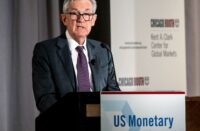By Joey Roulette
Donald Trump, the incoming US President, has chosen Jared Isaacman, renowned private astronaut and close associate of SpaceX’s Elon Musk, to lead NASA. Isaacman is a significant figure in the fast-paced, commercially-oriented space industry, but stepping into the role of an administrator will present him with new political challenges.
Isaacman, the founder of payment processing firm Shift4 Payments, has embarked on two groundbreaking SpaceX missions, making him the first person to privately fund a spacewalk in September. Accepting Trump’s appointment, he projected a flourishing space economy and committed to leading a phase where humanity evolves into a genuine spacefaring civilization.
However, accelerating the agenda of privatized human spaceflight will likely require careful political maneuvering, including the scaling back of expensive, long-standing programs and garnering lawmaker support to augment NASA’s $25 billion budget.
Garrett Reisman, a retired NASA astronaut and SpaceX advisor, believes Isaacman will positively challenge NASA. Musk had suggested Trump pick Isaacman, viewing him as someone capable of achieving results at NASA, according to close sources.
The cost-cutting agenda of Trump and Musk that Isaacman is expected to follow includes the $24 billion Space Launch System and the under-development Gateway space station, which are both over-budget. Isaacman’s scrutiny will also likely extend to other missions, including NASA’s objective to bring back soil samples from Mars and its Artemis moon mission.
While likely to face opposition from lawmakers, budget cuts to expensive NASA programs could benefit companies like SpaceX that have adopted more cost-effective and faster methods of space travel. This approach differs from NASA’s traditional method of contracting companies to build spacecraft it owns, controls, and fully funds.
Former Oklahoma congressman Jim Bridenstine, Trump’s first NASA administrator, skillfully navigated these political challenges, securing budget increases for NASA’s flagship crewed space exploration program and increasing its reliance on private companies.
Bridenstine endorsed Isaacman’s Senate confirmation, citing his vision and successful track record in the private sector as ideal qualifications for leading NASA into a bold new era of exploration and discovery.
Since Trump’s first term, NASA has concentrated on returning humans to the moon. But the Artemis program, which uses NASA’s powerful Space Launch System (SLS) rocket and Musk’s Starship rocket, has faced budget overruns and delays, pushing the planned moon landing back to 2027.
NASA’s use of SpaceX’s Crew Dragon capsule, which offers cheaper astronaut rides to the International Space Station, has reinforced the agency’s commercial cost-saving strategy. It also threatens the future of NASA’s older and more expensive SLS rocket.
Allen Cutler, CEO of the Coalition for Deep Space Exploration, acknowledged that Isaacman will face challenges as he leads NASA into the future. However, he remains optimistic about the future of NASA under Trump.
“I think the relationship between Elon Musk and the president-elect will be beneficial for ensuring that NASA’s funding is secure, so I see that as a positive,” said current NASA administrator, Bill Nelson.




